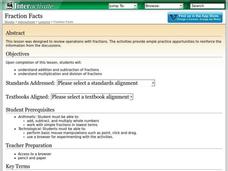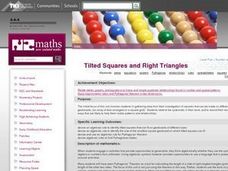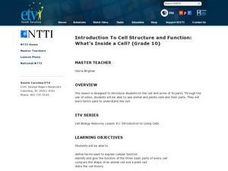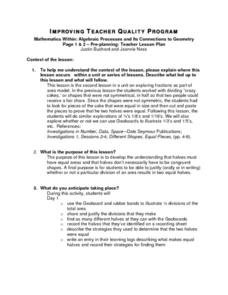Curated OER
Time Travel, Black Holes, and Relativity
Students read the novel, The Time Machine, and compare H.G. Well's perceptions of the future with those presented in The Third Wave, by Alvin Toffler. They research current scientific and mathematical theories that relate to space and time.
Curated OER
Mathematics in Art?
Fifth graders view prints of M.C. Escher's work. They look at examples of geometric figures and polygons and discuss places they have seen them. Students create their own tessellations. They write a report about the process they used in...
Curated OER
Scatter Cat!
First graders read the story Hairy MacLary, Scatter Cat by Lynley Dodd, to provide a context in which to use the language of movement and position and to provide opportunities to move themselves as they act out parts of the story.
Curated OER
Arrange the Classroom (Part 1 of 3)
Fifth graders arrange the classroom using all the moveable objects and through the exploration of area and perimeter. They determine the area of the classroom, create and label model pieces of furniture using graph paper, and create a...
Curated OER
Real Life Application of Area and Perimeter
Fifth graders explore real-life situations of area and perimeter. They develop a list of real-life applications of area and perimeter, select a situation, and write a step-by-step procedure and diagram on graph paper for solving the...
Curated OER
Measure the Angle
Students measure angles. In this angle lesson, students draw angles. They use a protractor to measure angles and identify the angle as straight, right, acute, or obtuse.
Curated OER
Points of Intersection
Students solve systems of equations. In this solving systems of equations lesson, students look for the intersection of the two lines in the system. Students solve systems that have one solution, no solution, and infinite...
Curated OER
South Caro-angular
Students classify and measure angles. In this angular lesson, students measure, contruct, and classify angles. They identify angles as acute, right, obtuse, and straight.
Curated OER
Reflections
Fifth graders create a reflection of a poygon using a Mira. They discover that a line connecting a vertiex of a polygon and the corresponding vertex of its reflection is perpendicular to the line of reflection. Students create a glide...
Curated OER
Fraction Facts
Learners explore the concept of fractions. For this fractions lesson, students perform basic operations such as addition and subtraction with fractions. Learners play a game on the computer called 'Fraction Four' that gives students...
Curated OER
Introductory to Area (Squares, Rectangles, and Triangles)
Students explore the concept of finding area. In this finding area lesson, students use knowledge of area of triangles to find area of squares and rectangles. Students find area of irregular figures by breaking the figure down into...
Curated OER
Optimization For Breakfast
Students identify he proportion of a cereal box. In this algebra lesson, students define the relationship between patterns, functions and relations. They model their understanding using the cereal box.
Curated OER
Sorting
Students sort a variety of manipulatives and use a software program that provides more sorting practice.
Curated OER
Finding The Area Of Shapes
Fourth graders investigate the concept of computing the area using different shapes. They use prior knowledge in order to devise a formula for a parallelogram. Scaffolding is provided by the teacher to find the formula of area for...
Curated OER
Tilted Squares and Right Triangles
Students investigate squares. They generate patterns from structured situations and find a rule for the general term and express it using words and symbols. Students generate patterns from a rule and substitute values and formulas.
Curated OER
Triangle Attributes and Measures
Seventh graders explore the concept of triangles. In this triangles lesson, 7th graders sort triangles according to various attributes such as acute, obtuse, isosceles, or equilateral. Students find the area and perimeter of triangles.
Curated OER
Getting Familiar with Fractals
Students use the Internet to answer lab questions about fractals, and then construct fractals using the initial stage and iteration rule. They complete tables and generate rules for the "nth" term and create their own fractals.
Curated OER
The Probability Project
Students work together to complete a project on probability. In groups, they solve probability equations based on the formula and scenerio given to them in a PowerPoint presentation. To end the lesson, they take a quiz on each problem...
Curated OER
Introduction To Cell Structure and Function: What's Inside a Cell?
Tenth graders are introduced to the cell and some of its parts. Through the use of video, 10th graders see animal and plants cells and their parts. They learn terms used to explain the cell.
Curated OER
Using Excel to Draw a Best Fit Line
Students create line graphs for given data in Microsoft Excel. Students follow step by step instructions on how to create their graph, including how to create a trend line. Students print graphs without trend lines and manually draw...
Curated OER
Fractions and Halves
Fourth graders examine halves of a whole and discover through activities that they must be exactly equal in size. Working with Geoboards and Dot-Paper Squares, the class practices finding halves that are both congruent and incongruent.
Curated OER
Does the Area of the Quadrilateral Change?
Seventh graders complete activities to further their understanding of area formulas. In this area lesson, 7th graders watch as the teacher uses Polystrips to model parallelograms. Students find the area of a rectangle and answer...
Curated OER
Graphing and Writing the Rule for Transformations
In this translations worksheet, learners graph the given image using the transformations described in six problems and write the rule for the transformation graphed in six more problems.
Curated OER
The Kangaroo Conundrum: A Study of a Quadratic Function
Students play a game and collect data for their graph. For this algebra lesson, students solve quadratic equations and identify properties of their graph. They describe the pattern created by the graph and the game.

























